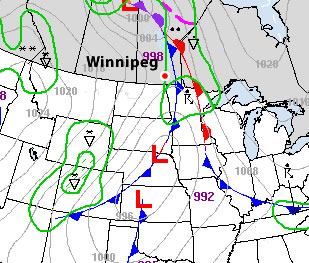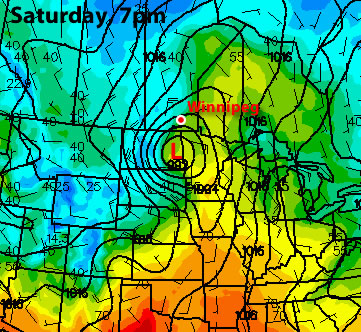Another weak weather system is in store to start the week. A bit of rain is in the forecast for Monday, but conditions will improve rapidly toward midweek.

A low pressure system and its associated cold front will generate some light rain over South-Central and Eastern Manitoba on Monday. Accumulations will generally be around 5mm in the Red River Valley and South-Eastern Manitoba. Some areas near the Ontario border may see amounts closer to 10mm. There is a small chance that some thunderstorms may become embedded within the area of rain. Any areas that experience weak thunderstorm activity may see slightly higher rainfall amounts.
Since a cold front will be passing through on Monday temperatures will be cooler than on the weekend. Highs in the Red River Valley and South-Eastern Manitoba will be around 10 degrees. Some areas will be slightly warmer or colder than that mark depending on when the rain starts and how quickly the cold front goes through.
The middle of the week is looking good. Tuesday should be a very nice day with highs in the mid teens and relatively light wind speeds. High temperatures on Wednesday should be in the high teens or near twenty degrees. On Thursday we will have a shot at twenty degrees yet again.

Unfortunately, conditions are forecast to turn unsettled for the weekend. Current models show a strong low pressure system impacting Southern Manitoba on Saturday and Sunday. Should this system pan out, which is never a certainty, it could be both a rain and snow producer. It is too early to get into any further detail, but this potential storm bears watching.
March 2012 was the warmest March on record in Winnipeg since records began in 1872. The month ended up with a mean temperature of +2.2C, which is 8.3 degrees warmer than normal (-6.1C). Prior to this year Winnipeg’s warmest March on record was the March of 1878, with a mean temperature of +1.6C. Below is a recap of the many records broken last month:
- 8 daily record high temperatures (11, 12, 15, 16, 17, 18, 19, 22)
- Earliest 20°C reading on record (March 18)
- Warmest overnight low in March (14°C on the night of March 18/19)
- Earliest thunderstorm on record since 1953 (Evening of March 19th)
- Warmest March day on record (March 19th, 23.7°C)
- Most significant departure from normal temperature for any day of the year (+23.4°C above normal on March 19th)
- 4 consecutive days over 19°C (Only 4 days since records began have reached that mark. From Rob’s Blog: In other words, it took only 4 days during this warm spell to match what took 140 years to accomplish.)
- Warmest March on Record (Mean temperature of 2.2°C, beating the previous record of 1.6°C set in 1878).
- Highest dew point in March (17°C on March 19th, need to finish parsing data set to verify)
Elsewhere in Weather News
Rare, Large Mexican Landspout Touches Down
On the outskirts of the city of Nuevo-Laredo, Mexico, located near the Texan border, an unusual sight could be seen on Thursday, March the 29th. An abnormally large landspout touched down for an extended period of time, picking up dust, trees, shrubs and flipping over a trailer on the highway. In this case, thankfully no one was injured but landspouts are often underestimated and can create as much damage as a tornado, over a smaller area.

The landspout is of the same family as a tornado however they have different characteristics than a tornado, which is typically spawned by a supercell. Landspouts usually spin up under towering cumulus or non-supercellular storms, as the updraft catches the rotation at ground level. This is different compared to a tornado, which starts from the base of a supercell as a funnel and proceeds to drop until it reaches the ground and becomes a tornado. The speed inside this rotating column of air (landspout) increases as the column is stretched out and can possibly become as damaging as a tornado.
The severe, elevated storm also brought with it some hail the size of tennis balls that accompanied the landspout. No other damage other than the flipped trailer was reported as the landspout moved into unpopulated areas of the Mexican plains.
Elsewhere in Weather News has been provided by Matt
